Governance and Finance
In recent decades, corporate governance no longer focuses on maximizing shareholder value but on balancing all stakeholders' interests. Corporate governance is then viewed more broadly as the nexus of rules, practices, and processes that determine the objective of a firm. Absent good governance, shareholders might realise inferior returns, creditors might lose interest payments, business partners might suffer from contract breaches, and employees might lose their future career opportunities (e. g., managers that used to work for Enron). High-quality governance ensures that all stakeholders' capital is effectively managed. Firms benefit from good governance in various ways, such as a higher valuation, a lower cost of capital, better talent attraction, and higher customer loyalty, for example.
The research group “Governance and Finance” studies traditional and modern views of corporate governance in financial markets and contributes to the literature in two ways. First, it contributes to understanding the effectiveness of different governance mechanisms' roles in talent selection, incentive, and retention. Individuals carry out corporate objectives, and good governance must ensure that the most qualified talent is allocated to the optimal position, exerts optimal effort, and stays with the firm. For example, the most important duty of the board of directors is to select, incentive, and retain the most talented/suitable CEO.
Second, this group also investigates how various forces in credit market impact corporate governance. Various stakeholders seek to influence corporate strategy differently with recent advances in the financial market. For example, the rise of common ownership might reduce firms' incentives to compete, the increase of active ownership might suddenly switch firms' investment strategies (i. e., shareholder activism), and the participation of shareholders in the credit market provides opportunities to internalise the shareholder-creditor conflicts. This group's research seeks to advance the knowledge of different stakeholders' methods and their effectiveness in influencing governance objects.
Workpackage 1: Talent Selection, Incentive, and Retention
Workpackage 2: Stakeholders and Governance
Research Cluster
Financial Resilience and RegulationYour contact

- Department Financial Markets
Refereed Publications

Financial Analysts' Career Concerns and the Cost of Private Debt
in: Journal of Corporate Finance, April 2021
Abstract
Career-concerned analysts are averse to firm risk. Not only does higher firm risk require more effort to analyze the firm, thus constraining analysts' ability to earn more remuneration through covering more firms, but it also jeopardizes their research quality and career advancement. As such, career concerns incentivize analysts to pressure firms to undertake risk-management activities, thus leading to a lower cost of debt. Consistent with our hypothesis, we find a negative association between analyst career concerns and bank loan spreads. In addition, our mediation analysis suggests that this association is achieved through the channel of reducing firm risk. Additional tests suggest that the effect of analyst career concerns on loan spreads is more pronounced for firms with higher analyst coverage. Our study is the first to identify the demand for risk management as a key channel through which analysts help reduce the cost of debt.

The Influence of Bondholder Concentration and Temporal Orientation on Investments in R&D
in: Journal of Management, No. 3, 2021
Abstract
Although innovation can be a critical source of competitive advantage, research has found that debt can erode management’s willingness to invest in R&D. In this article, we employ a stakeholder bargaining power perspective to argue that this effect is most pronounced when the firm’s bonds are concentrated in the hands of bond blockholders. Furthermore, we contend that the temporal orientation of bondholders influences this relationship. Specifically, while it is commonly assumed that bondholders have a limited temporal orientation that induces them to focus on short-term value appropriation, we argue that some bond blockholders adopt a long-term temporal orientation. This orientation, in turn, makes them more inclined to support long-term value creation for the firm in the form of enhanced investments in R&D. Moreover, while agency theory suggests that there is an inherent conflict of interest between shareholders and bondholders, our results suggest that the temporal orientation of investors (i.e., both shareholders and bondholders) matters much more than whether they invested in the firm’s equity or its debt.

Evolvement of China-related Topics in Academic Accounting Research: Machine Learning Evidence
in: China Accounting and Finance Review, No. 4, 2020
Abstract
This study employs an unsupervised machine learning approach to explore the evolution of accounting research. We are particularly interested in exploring why international researchers and audiences are interested in China-related issues; what kinds of research topics related to China are mainly investigated in globally recognised journals; and what patterns and emerging topics can be explored by comprehensively analysing a big sample. Using a training sample of 23,220 articles from 46 accounting journals over the period 1980 to 2018, we first identify the optimal number of accounting research topics; the dynamic patterns of these accounting research topics are explored on the basis of 46 accounting journals to show changes in the focus of accounting research. Further, we collect articles related to Chinese accounting research from 18 accounting journals, eight finance journals, and eight management journals over the period 1980 to 2018. We objectively identify China-related accounting research topics and map them to the stages of China’s economic development. We attempt to identify the China-related issues global researchers are interested in and whether accounting research reflects the economic context. We use HistCite TM to generate a citation map along a timeline to illustrate the connections between topics. The citation clusters demonstrate “tribalism” phenomena in accounting research. The topics related to Chinese accounting research conducted by international accounting researchers reveal that accounting changes mirror economic reforms. Our findings indicate that accounting research is embedded in the economic context.
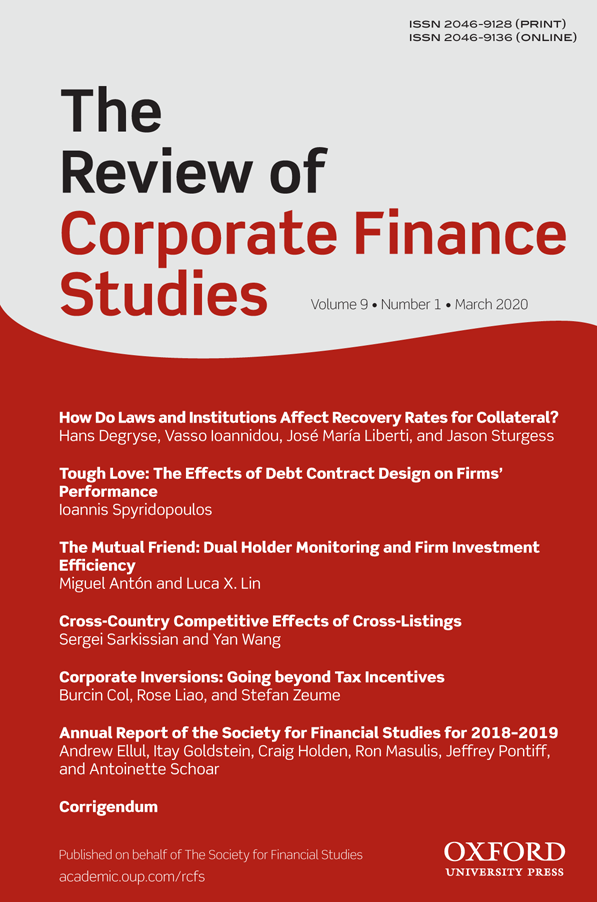
Tournament Incentives and Acquisition Performance
in: Review of Corporate Finance Studies, No. 2, 2020
Abstract
This paper examines the impact of promotion-based tournament incentives on corporate acquisition performance. Measuring tournament incentives as the compensation ratio between the CEO and other senior executives, we show that acquirers with greater tournament incentives experience lower announcement returns. Further analysis shows that the negative effect is driven by the risk-seeking behavior of senior executives induced by tournament incentives. Our results are robust to alternative identification strategies. Our evidence highlights that senior executives, in addition to the CEO, play an influential role in acquisition decisions.

Investor Relations and IPO Performance
in: Review of Accounting Studies, No. 2, 2020
Abstract
We analyze the value of investor relations (IR) strategies to IPO firms. We find that firms that are less visible and have inexperienced management tend to hire IR consultants prior to the issue date. IR consultants help create positive news coverage before an IPO, as reflected in a more optimistic tone of published media. Their presence is associated with higher underpricing at the IPO date but with lower long-run returns. IR-backed IPOs also exhibit disproportionately higher insider-related agency problems, as IR-induced higher underpricing tends to occur primarily in IPOs where underwriter and venture capitalist agency conflicts are more severe. These findings suggest that the IR programs of IPO firm are mostly short-term oriented and facilitate the ulterior motives of some insiders (underwriters and venture capitalists) targeting higher first-day returns.
Working Papers
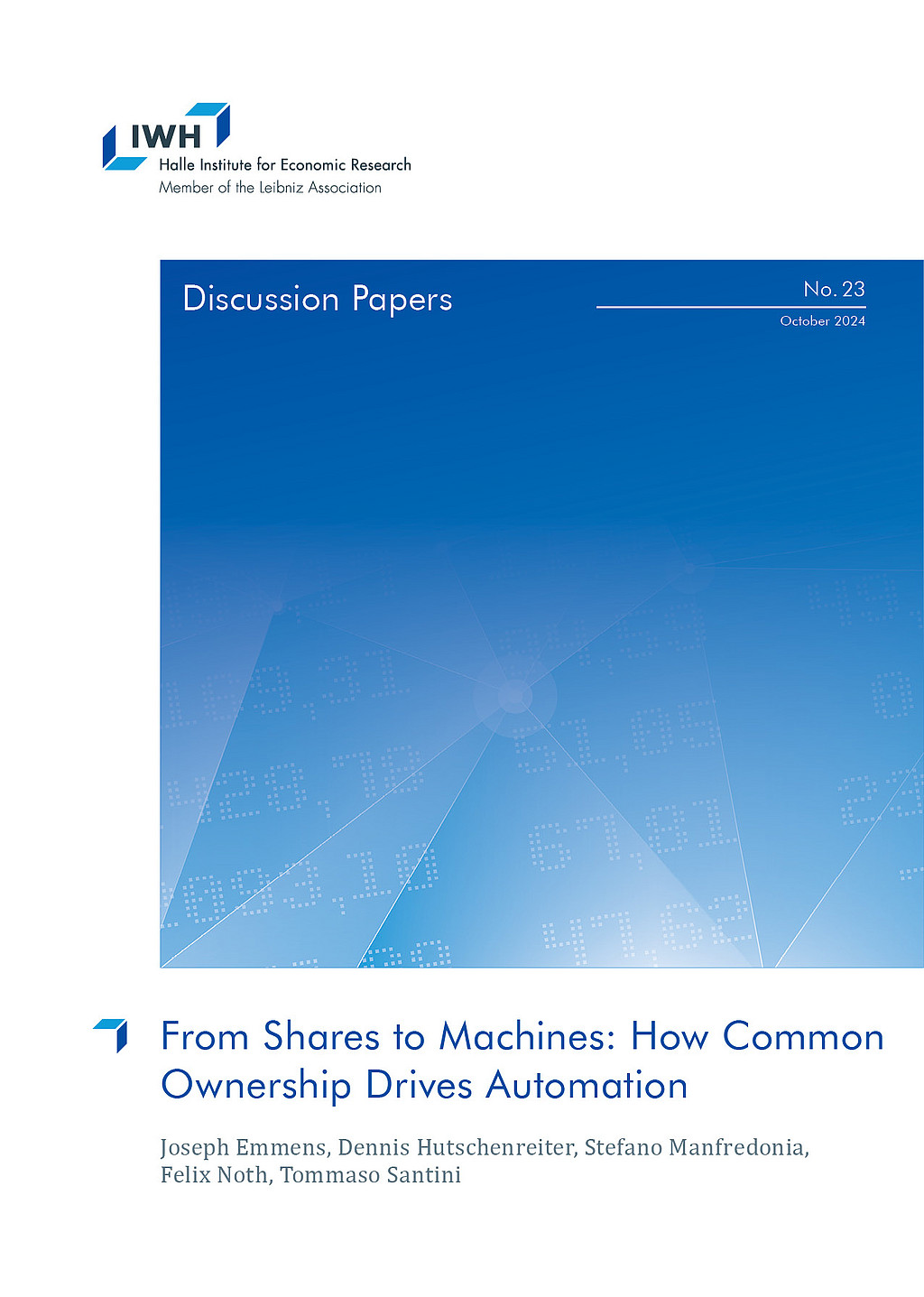
From Shares to Machines: How Common Ownership Drives Automation
in: IWH Discussion Papers, No. 23, 2024
read publication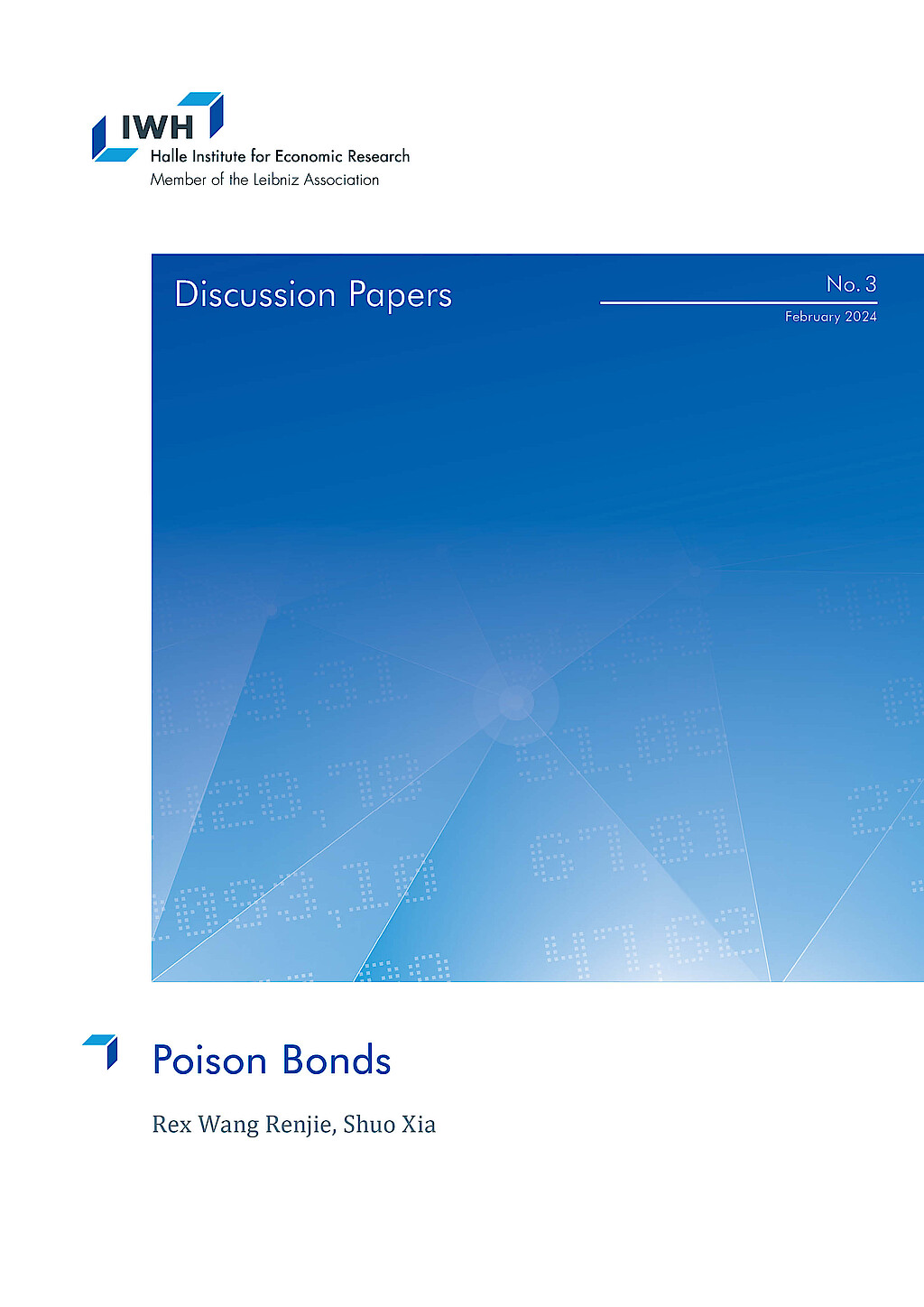
Poison Bonds
in: IWH Discussion Papers, No. 3, 2024
Abstract
This paper documents the rise of “poison bonds”, which are corporate bonds that allow bondholders to demand immediate repayment in a change-of-control event. The share of poison bonds among new issues has grown substantially in recent years, from below 20% in the 90s to over 60% since mid-2000s. This increase is predominantly driven by investment-grade issues. We provide causal evidence that the pressure to eliminate poison pills has led firms to issue poison bonds as an alternative. Our analysis suggests that this practice entrenches incumbent managers and destroys shareholder value. Holding a portfolio of firms that remove poison pills but promptly issue poison bonds results in negative abnormal returns of −7.3% per year. Our findings have important implications for the agency theory of debt: (i) more debt may not discipline the management; and (ii) even without financial distress, managerial entrenchment can lead to agency conflicts between shareholders and creditors.
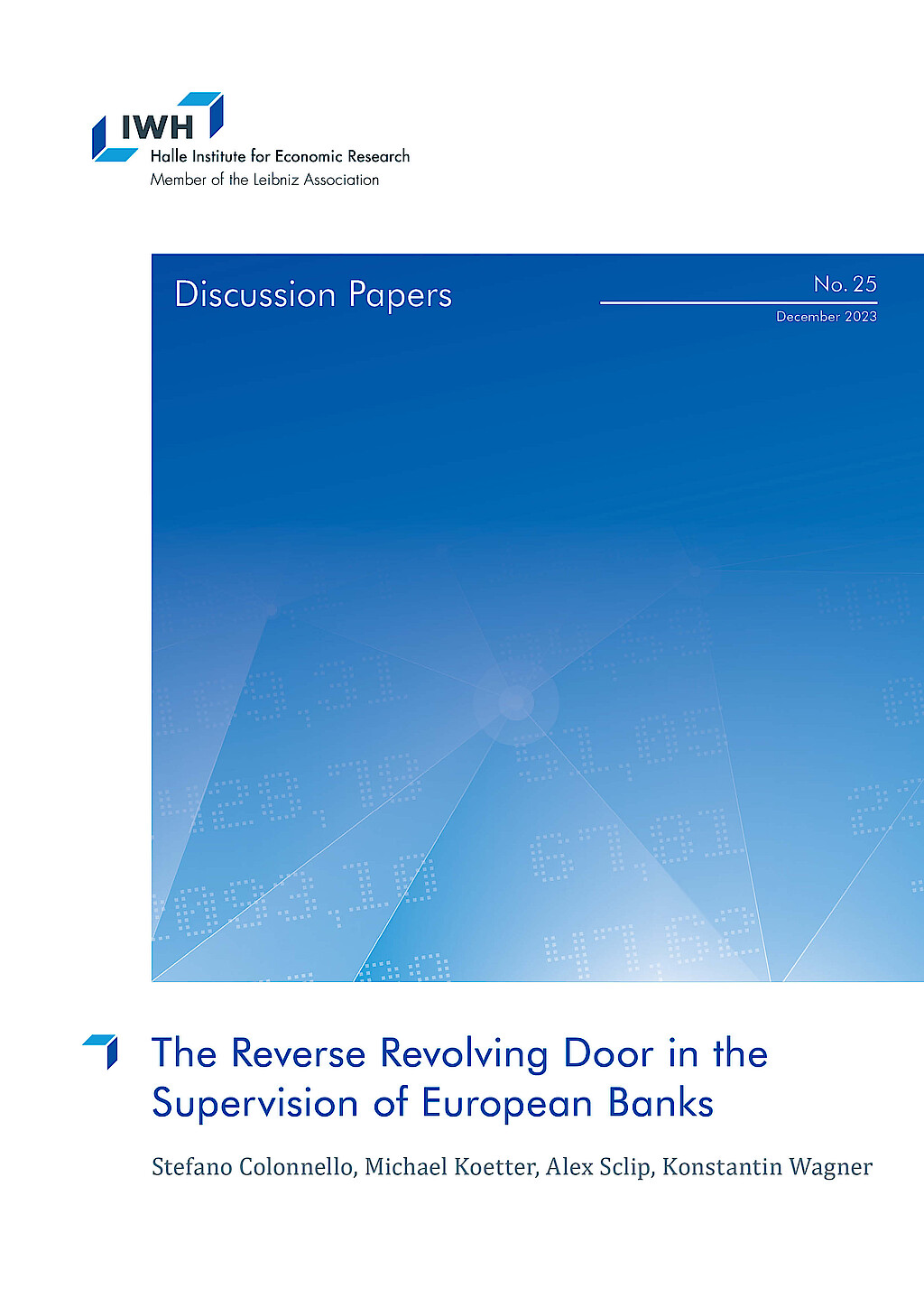
The Reverse Revolving Door in the Supervision of European Banks
in: IWH Discussion Papers, No. 25, 2023
Abstract
We show that around one third of executive directors on the boards of national supervisory authorities (NSA) in European banking have an employment history in the financial industry. The appointment of executives without a finance background associates with negative valuation effects. Appointments of former bankers, in turn, spark positive stock market reactions. This „proximity premium“ of supervised banks is a more likely driver of positive valuation effects than superior financial expertise or intrinsic skills of former executives from the financial industry. Prior to the inception of the European Single Supervisory Mechanism, the presence of former financial industry executives on the board of NSA associates with lower regulatory capital and faster growth of banks, pointing to a more lenient supervisory style.

Poison Bonds
in: SSRN Discussion Paper, 2023
Abstract
This paper documents the rise of "poison bonds", which are corporate bonds that allow bondholders to demand immediate repayment in a change-of-control event. The share of poison bonds among new issues has grown substantially in recent years, from below 20% in the 90s to over 60% after 2005. This increase is predominantly driven by investment-grade issues. We provide causal evidence that the pressure to eliminate poison pills has led firms to issue poison bonds as an alternative. Further analyses suggest that this practice entrenches incumbent managers, coincidentally benefits bondholders, but destroys shareholder value. Holding a portfolio of firms that remove poison pills but promptly issue poison bonds results in negative abnormal returns of -7.3% per year. Our findings have important implications for understanding the agency benefits and costs of debt: (1) more debt does not necessarily discipline the management; and (2) even without financial distress, managerial entrenchment can lead to conflicts between shareholders and creditors.
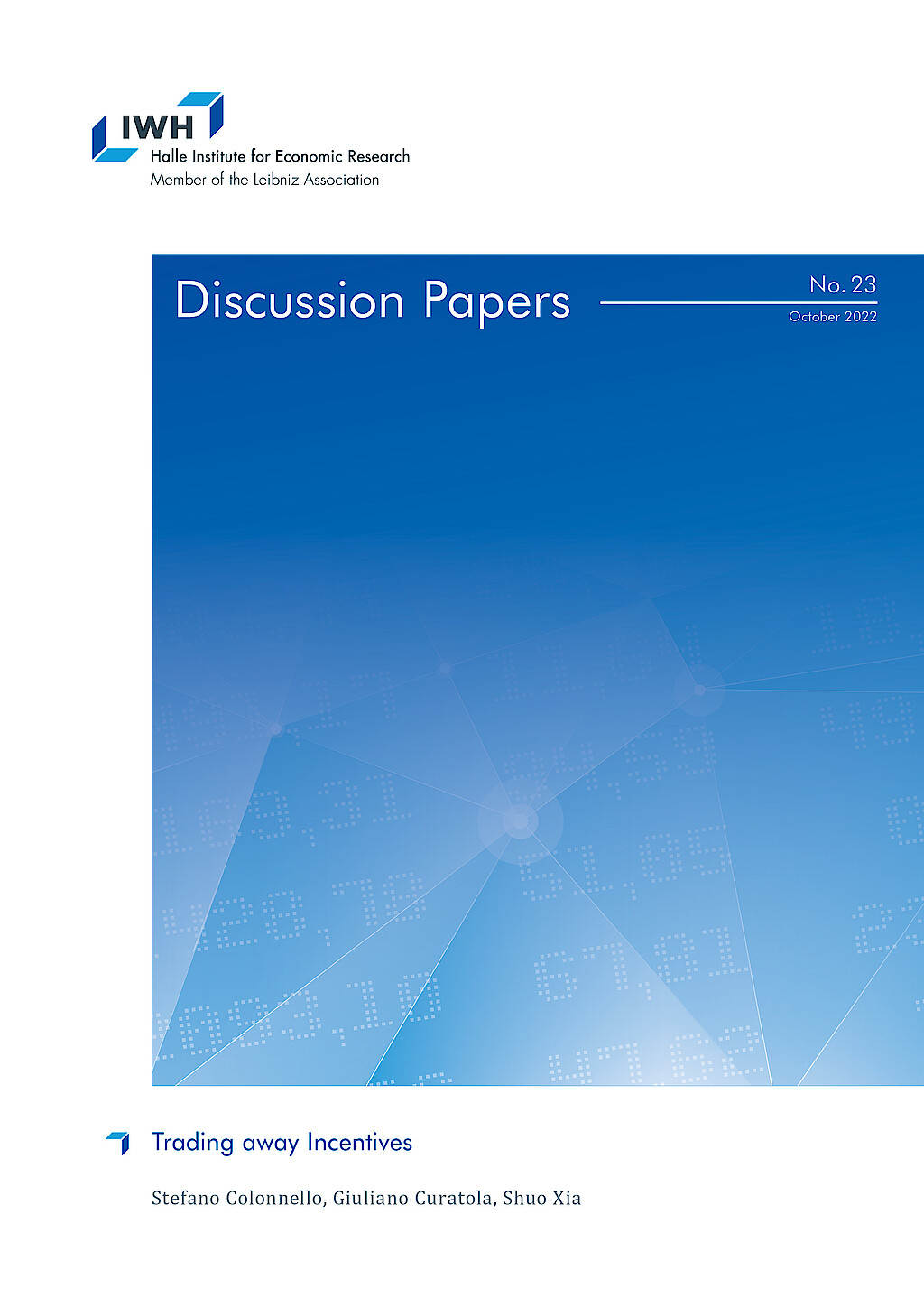
Trading away Incentives
in: IWH Discussion Papers, No. 23, 2022
Abstract
Equity pay has been the primary component of managerial compensation packages at US public firms since the early 1990s. Using a comprehensive sample of top executives from 1992-2020, we estimate to what extent they trade firm equity held in their portfolios to neutralize increments in ownership due to annual equity pay. Executives accommodate ownership increases linked to options awards. Conversely, increases in stock holdings linked to option exercises and restricted stock grants are largely neutralized through comparable sales of unrestricted shares. Variation in stock trading responses across executives hardly appears to respond to diversification motives. From a theoretical standpoint, these results challenge (i) the common, generally implicit assumption that managers cannot undo their incentive packages, (ii) the standard modeling practice of treating different equity pay items homogeneously, and (iii) the often taken for granted crucial role of diversification motives in managers’ portfolio choices.









